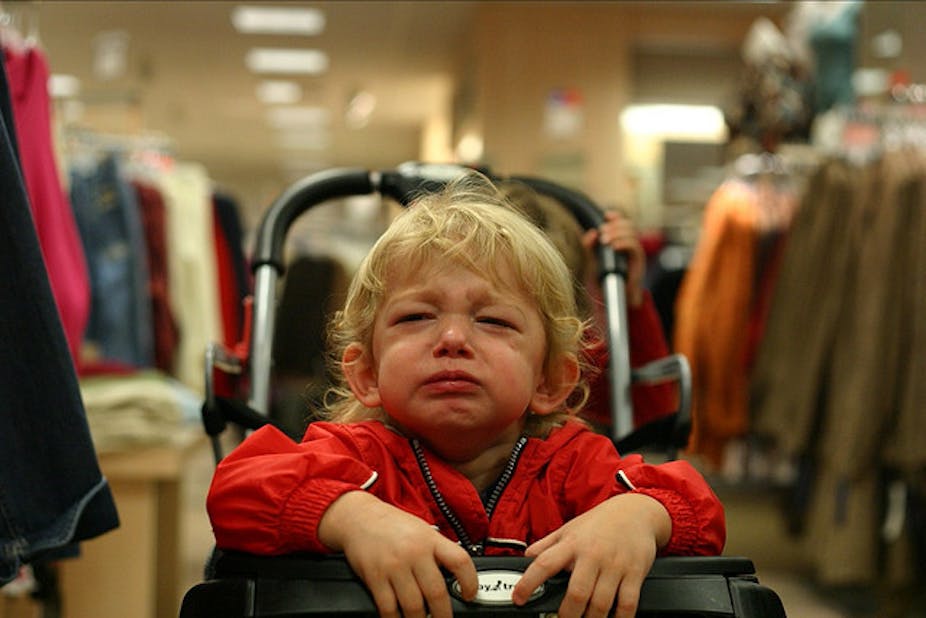Research published this month in the journal Pediatrics confirms what child advocates have long known: it’s never okay to hit children.
Study author Tracie Afifi and her colleagues investigated the link between children being hit, pushed and shoved, and the development of psychological problems later in life. They found that harsh physical punishment was associated with depression, anxiety, substance abuse and personality disorders.
The findings are important because they challenge the belief that there is a distinction between harsh physical punishment and child abuse. They also support previous research linking the physical punishment of children with harmful effects in childhood and adulthood.
Outdated attitudes toward children
Calls to ban the physical punishment of children inevitably meet with arguments that parents should have the right to discipline their children as they see fit without state interference. Such claims perpetuate perceptions of children as parents’ possessions without rights to the dignity and respect afforded to adults in a civilised society.
In the not-so-distant past, husbands claimed similar rights to “discipline” and control their wives, and teachers found it difficult to imagine how to control school children without resorting to the ruler, cane or strap.
Society has progressed – to a degree. Hitting intimate partners, employees, infants in day care centres and school children is no longer tolerated (except – incredibly - in some Western Australian and Queensland schools). A husband, boss, child care worker or teacher in most Australian schools cannot defend a charge of assault by arguing that they were just carrying out “reasonable chastisement”.
Why then is it such a big step to remove this defence in cases where a parent assaults his or her child? Why are small, vulnerable, and impressionable children singled out as the only people who can legally be hit?

The impact of physical punishment
Some adults argue that hitting children, euphemistically described as “smacking”, is not violence. Yet children, whose voices have historically been silenced, have described how smacking hurts them physically and emotionally.
Many children also experience discipline that does not hurt and they want parents to know that alternatives to hitting are effective and more respectful. As one 12 year old put it, “you shouldn’t hit people… there’s a better way than hurting someone”.
There is increasingly strong evidence that parental physical punishment may adversely affect children’s development into adulthood. It has been associated with aggression, antisocial behaviour, and mental health issues throughout life, along with a heightened risk of abusing one’s children and intimate partners. Researcher Tracie Afifi and her colleagues go so far as to argue that “reducing physical punishment may help decrease the prevalence of mental disorders in the general population”.
There are always alternatives to physical aggression in response to challenging or annoying behaviours. Power relationships, anger, frustration, and loss of self control frequently motivate violent behaviour. Indeed, many parents admit that they resort to hitting their children when they are tired, angry or distressed, and that they later feel regret and remorse. Parents may even apologise to their children.
Sadly, on too many occasions, physical punishment exceeds even socially agreed limits. Children have been seriously injured and even killed.
Positive parent-child relationships
Most parents love their children and want to be the best parents that they can be. Children are more likely to respect parents who treat them with respect and teach them constructive ways to behave. Children thrive on positive recognition that motivates the repetition of behaviours parents want to see, and also enhances children’s self esteem.

Some parents hit their children believing that it’s reasonable and acceptable. Often parents were physically punished as children, and believe it did them no harm.
Until we question this myth, without judging such parents, we will continue to deny children their rights. And we will continue to instill fear, anger and resentment, and teach children aggression and violence is a means of settling disputes.
It’s time to ban all physical punishment
As Marta Santos Pais, the Special Representative of the United Nations Secretary-General on Violence against Children, recently said, “Legislation provides an ethical and normative framework to promote values of respect, tolerance and human rights.”
To date, all forms of physical punishment are banned in 32 countries, including New Zealand (since 2007). Sweden banned physical punishment over 30 years ago. Other countries in Scandinavia, Europe and Africa followed. Brazil is on the verge of enacting a ban.
Australia ratified the United Nations Convention on the Rights of the Child in 1990. Yet, over 20 years later, Australian governments have resisted adopting an enlightened, proactive stance on the physical punishment of children. This reticence has been met with international criticism.
Banning all physical punishment would reflect governments’ unreserved commitment to promoting Australian children’s well-being, positive sense of self, and protection from harm. A ban would primarily serve to educate parents, and not to criminalise them. Its aim would be to promote positive discipline and to grant children and adults equal protection from assault.
Contrary to some claims, countries that have already banned physical punishment do not report a surge in criminal charges against parents.
The way forward
Few parents choose to act in ways that might unnecessarily risk hurting or harming their children. But parenting is a huge responsibility and parents need to be informed about positive, constructive discipline. Such discipline sets up and consistently reinforces the boundaries that all children need and expect.
Parents also need to be supported by governments, communities, families and friends so that they can optimally nurture and enjoy their children. Hitting children is never reasonable and can no longer be justified.

